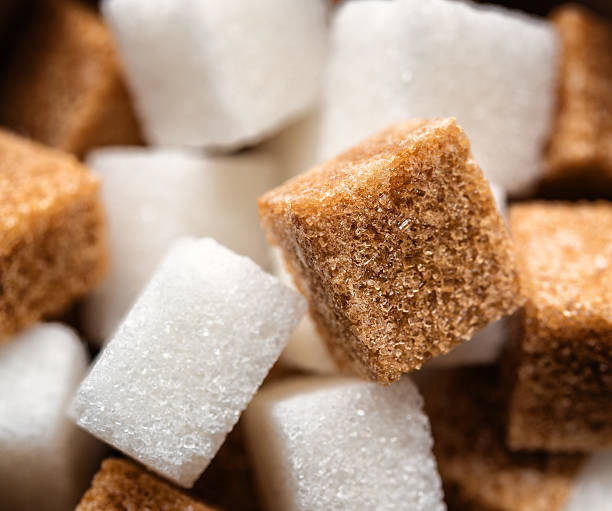Coconut sugar has been at the peak of popularity in recent years. It is often described as a healthy alternative to sugar and appears in recipes for “healthier” baked goods. It is even sometimes called a “superfood”.
It is also much more expensive than sugar. In shops, coconut sugar costs several times more than regular white beet sugar.
So does coconut sugar have any benefits that make it worth paying extra for? Is coconut sugar healthy? Is it better for you than other types of sugar? Let’s take a closer look.
What is coconut sugar?
Coconut sugar is made from the nectar of the flower buds of the coconut tree. The nectar is then heated. A large amount of water is evaporated and then dried to form granulated sugar. Coconut sugar has a brown colour and a slight caramel flavour. Organic/BIO coconut sugar comes from crops grown without the use of synthetic pesticides and herbicides.
Coconut sugar can be used in recipes instead of white table sugar, although dishes and drinks with it may taste a little different (due to the slightly caramel taste of coconut sugar).

Is coconut sugar good for you?
You may have seen information online about how nutritious coconut sugar is compared to regular sugar. However, the high amounts of vitamins and minerals claimed in various articles are often not supported by serious analyses or studies. This does not mean that there are not some vitamins or minerals in coconut sugar. However, they are present in low concentrations. To make it simple. Coconut sugar is still about 95% simple carbohydrates (glucose and fructose boil off as in regular sugar). The rest is mainly inulin. The difference between coconut and regular sugar is therefore negligible from a caloric and nutritional point of view.
I’ve also come across claims that coconut sugar is healthier than other sweeteners because it doesn’t contain fructose, which some research suggests may not be good for the body if consumed in large quantities. Once again, I must reiterate that coconut sugar actually contains up to 90 percent sucrose, and sucrose is broken down in the body into glucose and fructose.
Is coconut sugar an added sugar?
When you put coconut sugar in your coffee or use it in packaged foods and recipes, it is considered an added sugar, just like white sugar, molasses, honey and agave nectar, among others.
Is coconut sugar good for weight loss?
There is no evidence that coconut sugar has any miraculous ability to lose weight. The energy value is slightly lower than that of regular white sugar. There is 4 kcal of energy in 1 g of white sugar. One gram of coconut sugar contains about 3.6 – 3.9 kcal (depending on the manufacturer’s courage to give a slightly lower value). In the USA, for example, the energy value of coconut sugar is no different from white sugar…
Is coconut sugar better for blood sugar?
One of the main selling points of coconut sugar is that it is better for blood sugar levels because it has a lower glycemic index than white sugar.
First, let’s review what the Glycaemic Index is: the Glycaemic Index (GI) ranks foods on a scale of 0 to 100 according to how much they raise blood sugar levels when eaten. A food with a low glycaemic index (55 or less) will not cause as much of a rise in blood sugar as a food with a high glycaemic index (70 or more). Eating a diet rich in foods with a lower glycaemic index is thought to be good for your health as it can help keep blood sugar levels down. This can help to reduce the risk of diabetes 2, for example. type.
Very often you will find on the internet that the GI of coconut sugar is 35, which would mean that it has a much lower GI than regular table sugar (which has a GI of 60-65). When I looked up the source of this value, I found that it was based on a study of 10 subjects (humans) by the Food and Nutrition Research Institute of the Philippines.
But there are other (much larger studies) by several Australian universities that assign a GI value of 54-55 for coconut sugar. This is the value that most reputable sources work with today.
Coconut and white sugar are therefore very close in terms of glycemic index.
Is coconut sugar better for you than brown sugar?
It’s not. Brown sugar is simply white sugar (from sugar cane or sugar beet) to which molasses is added for flavour and colour, or it simply does not go through the last stage of refining and a percentage of molasses remains. Coconut sugar comes from the nectar of the flower buds of the coconut palm. Neither of these sugars is particularly “healthy” or beneficial. They are simply two similar types of sweeteners and if you need to sweeten a food or drink, you can choose either one and the effect on your body will be very similar.

Is coconut sugar less processed?
Coconut sugar is said to be less processed than regular table sugar. Coconut sugar is made by heating the nectar until the liquid evaporates and then grinding it into sugar granules. It is similar to raw table sugar, from which the molasses is not removed and which retains a darker colour.
White sugar, on the other hand, is refined (purified) by removing molasses and impurities with lime and carbon dioxide. The white sugar is also filtered and centrifuged in a centrifuge to remove impurities.
So it can be said that coconut sugar requires fewer steps to get from the plant to the bag. And it is “unrefined”, which means that no impurities are removed from it. But “unrefined” is not the same as “unprocessed”. There is still processing involved in the production of coconut sugar.
What are the disadvantages of coconut sugar?
The biggest disadvantage of coconut sugar is its price. Compared to white sugar, it is 8 to 9 times more expensive. This is the fat that often leads customers to blindly believe that they have to buy a healthier product for the current price. Unfortunately, this is not the case and the price of coconut sugar is determined more by the cost of production (quantity of nectar, efficiency of production) and mainly by the margins of producers and distributors.
Should you use coconut sugar?
Those who have read this far will already have a picture for themselves. For me, the price-performance ratio is clearly on the side of white sugar. But let’s be clear. If you like coconut sugar and don’t mind the price, feel free to sweeten it. I just want to objectively compare these two alternatives against each other. What you ultimately choose is up to you. 😊

